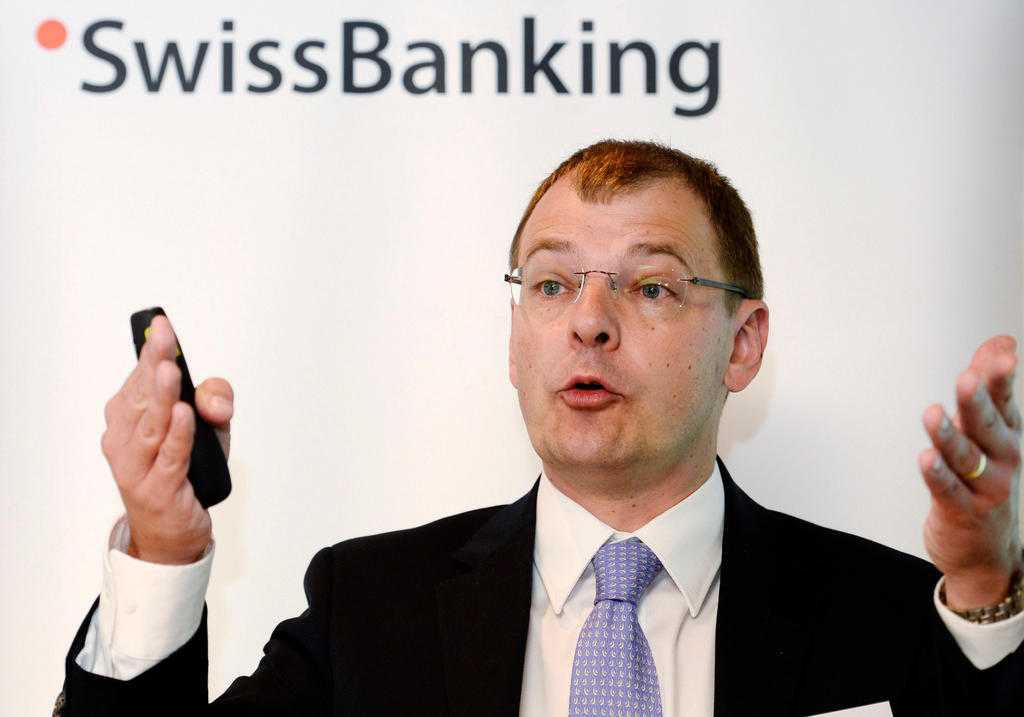Can fintech save Swiss private banking?

Has the future of banking already arrived? A growing number of financial technology start-ups is trying to shake up the industry, but not all traditional players are convinced.
“Fintech is not a silver bullet for the industry but it is absolutely necessary for banks to go down the road of digital transformation,” Matthias Bossardt, head of cyber security at KPMG Switzerland, told swissinfo.ch. In a recent report, KPMG’s predicts that many Swiss private banks will disappear as costs rise, margins shrink and clients play hard to get.
The fact is, Swiss private banks can no longer rely on the old business model of hiding their clients’ money. They also have to contend with higher regulatory and compliance costs, a shift of wealth creation towards emerging economies and the sluggish performance of financial markets.
swissinfo.ch takes a look at some of the new Swiss fintech models that could help traditional private banks climb out of a hole – or replace them.
Regulation/compliance
Basel III capital reserve requirements with a tougher ‘Swiss Finish’, anti-money laundering (AML) and anti-tax evasion initiatives and enhanced customer protection rules are costing banks more time and money than ever before.
“The key cost explosion is in non-client facing elements. Regulation is one of the huge cost blocks. Client relationship managers are spending more time on back and mid-office duties and less time with clients,” KPMG’s head of digital transformation and outsourcing, Prafull Sharma, told swissinfo.ch.

More
How blockchain could soon affect everyday lives
Speaking at the Swiss International Finance Forum in Bern last June, Henri Arslanian of PwC Hong Kong, said staff costs typically eat up 80% of AML expenses.
Several start-ups – such as QumramExternal link, NetGuardiansExternal link and SwissMetricsExternal link – have developed ‘regtech’ algorithms to automatically crunch the ever-increasing mountain of big data into manageable and meaningful information. This allows banks to weed out rotten apples among potential new clients, detect cyber fraud and check credit histories to determine the financial health of customers.
Plug & Play digital platforms
The cost and complexity of updating IT systems to new digital standards is being increasingly outsourced to third party specialists. “In times gone by, when business was booming and margins were high, banks were not under such high pressure to innovate,” said KPMG’s Matthias Bossardt “But now banks need these resources just to keep themselves alive.”
State telecoms provider SwisscomExternal link operates platforms for more than 80 banks. Companies such as AvaloqExternal link, TemenosExternal link and AdditivExternal link are also well established providers of banking software systems that banks can plug into to run certain services – minus the cost of having to develop it themselves.
According to KPMG, outsourcing can actually enhance a bank’s cyber security as the fintechs are crowded with such specialists. And piggybacking on third party digital platforms need not compromise a bank’s unique culture and personality as they free up resources to concentrate on clients and products.
Robo-advisory
Rather than offer their services to traditional private banks, some fintechs are disrupting the industry with new models. SwissquoteExternal link has led the way for some years, but digital robo-advisory banks – such as Descartes FinanceExternal link and True WealthExternal link – have joined the game.
Robo-advisors present a partial threat to the mainstream sector. The upstarts allow clients to have a far greater say in managing their assets and getting access to information, but lack the know-how, experience and personal touch of private bankers. In fact, both Descartes and True Wealth have formed partnership alliances with traditional banks.
KMPG’s Bossardt believes such technology might be a tool for private banks to break into the rapidly expanding Asian market. “Asian clients are definitely into the latest gadgets and technology for their banking relationship. Embracing fintech could open up new markets for many smaller private banks,” he said.
Blockchain/cryptocurrencies
As a rule, Swiss banks eschew cryptocurrencies as a tailor-made fad for criminals that have been blown into an unsustainable bubble by irrational investors. Only a few – such as Falcon, Swissquote, Cornèr and Vontobel – have dabbled into the new asset class, but at an arm’s length.
However, the likes of Smart ValorExternal link and MelonportExternal link are openly embracing blockchain, which allows people to both store and send their assets peer-to-peer outside of the traditional financial system using cryptocurrencies, which are not printed by central banks.
Smart Valor founder Olga Feldmeier says she was inspired to set up the alternative financial institution after living through rampant inflation that wiped out the savings of countless Ukranians and destroy many jobs in the 1990s.
“People should have the ability to protect their wealth if governments decide to print money,” she told swissinfo.ch. “Being able to secure your own savings is a human right.” Smart Valor promises to be the first Swiss crypto bank that will allow anyone to invest in tokenised alternative investments via a decentralised marketplace, not just a privileged few.
LykkeExternal link is also encouraging investors to take greater control of their assets by developing a blockchain trading platform that promises to eventually handle trades in all asset classes wrapped in digital crypto tokens. Rather than hide in the shadows, Lykke wants competitors to plug into its open source system and aims to go mainstream by gaining banking licenses around the world.
Such disruptive new ideas have met with some resistance from the mainstream financial sector. But the developers of blockchain systems believe it is only a matter of time before traditional companies are wowed by the success of their models and are forced to copy them.

In compliance with the JTI standards
More: SWI swissinfo.ch certified by the Journalism Trust Initiative




You can find an overview of ongoing debates with our journalists here. Please join us!
If you want to start a conversation about a topic raised in this article or want to report factual errors, email us at english@swissinfo.ch.